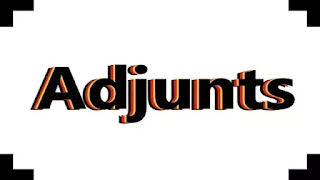ADJUNCTS
An adverb may function as adverbial, a constituent district from subject, verb, object and complement. If an adverbial is integrated to some extent into the structure of the clause, it is termed as an ADJUNCT.
ADJUNCT:
*Viewpoint
*Focusing – Additive, Limiter
*Intensifier – Emphasizer, Amplifier, Downtoner
*Process – Manner, Means, Instrument
*Place – Position, Direction
*Time – When, Duration, Frequency, Relationship
VIEWPOINT ADJUNCTS
Viewpoint adjuncts show your attitude to what you are saying or to make your listener has a particular attitude to what you are saying.
Functioning as an adverb approach is usually derived from adjectives with the addition of a -ly suffix: – Geographically, ethnically and linguistically, these lands are closer to the sea.
Viewpoint adjuncts derived from nouns by the addition of the suffix -wise are considered informal: – Program-wise, the new thing on TV last night was the first episode of the new science series.
All -ly viewpoint adjuncts have a corresponding participle sentence with speaking, e.g. visually > visually speaking and a corresponding prepositional phrase with from a [adjective phrase] point of view, e.g. morally > moral point of view.
FOCUSING ADJUNCTS
Focusing adjunts indicate that what is being transmitted is limited to the focused portion – LIMITER ADJUNCTS – or that the focused portion is an addition – ADDITIVE ADJUNCTS. Most focusing adjuncts are adverbs.
*LIMITERS
(a) EXCLUSIVES limit what is said to a part of the focused e.g. alone, just, merely, only, purely, simply.
(b) PARTICULARIZERS limits what is said, in particular or mainly to a part, focused e.g. chiefly, mainly, especially, mostly, in particular.
*ADDITIVES either, neither, nor, also, too, as well as, even, in addition
.You can get a B grade JUST for that answer. .The workers, IN PARTICULAR, are dissatisfied with the government. .We bought some orange juice AS WELL.
Focusing adjuncts cannot be modified
INTENSIFIERS ADJUNCTS
Intensifiers indicate a point on the intensity scale which may be high or low. They are of three semantic types: EMPHASIZERS have a general heightening effect; AMPLIFIERS scale upwards from an assumed norm; DOWNTONERS have a lowering effect.
EMPHASIZERS – definitely, indeed, actually, certainly, clearly, obviously, for sure, frankly, honestly, literally, plainly, really, surely, simply, fairly.
I honestly don’t know what he wants.
AMPLIFIERS
(a) MAXIMIZERS, which indicating the upper end of the scale; absolutely, entirely, fully, quite, thoroughly, altogether, completely, utterly, most.
(b) BOOSTERS, which denote a high point on the scale; badly, deeply, greatly, heartily, much, so, violently, a great deal, a lot, by far, well.
– He ignored me completely. – They like her very much. – He quite forget about her birthday. – I understand your problem well.
DOWNTONERS
Downtoners have a lowering effect on the strength of the verb. The downtoners divided into four groups.
(a) COMPROMISERS have only a slight lowering effect: kind of/sort of (informal), quite/rather, more or less.
– I kind of like him.
– I quite enjoyed the party last night.
(b) DIMINISHERS scale downwards considerably: partly, slightly, somewhat, in part, to some extent
– I know him slighty.
– The incident somewhat influenced his life.
(c) MINIMIZERS scale downwards considerably: a bit, barely, hardly, little, scarcely, in the least
– I didn’t like it at all.
(d) APPROXIMATORS serve to express an approximation to the force of the verb: almost, nearly, as good as, all but
– I almost resigned.
PROCESS ADJUNCTS
Process adjuncts define in some way the process denote by the verb. Common proforms for process adjuncts are in that way, that way (informal), like that.
Process adjuncts can be divided into three semantic subclasses:
(a) MANNER: They sprayed tear gas indiscriminately on the protesters.
(b) MEANS: He decided to treat the patient surgically.
I go to school by bus.
He gained access to the system by means of a bribe to the guard.
(c) INSTRUMENT: He examined the specimen microscopically.
This knife can be used to cut cake.
Process adjuncts are combined with dynamic verbs, but not with state verbs.
SUBJECT ADJUNCTS
Subject adjuncts relate to the referent of the subject in an active clause as well as to the process or the state denoted by the verb.
SUBJECT ADJUNCTS :
*GENERAL – resentfully, with great unease
*VOLITIONAL – deliberately, (un)intentionally, purposely, reluctantly, voluntarily, wilfully, on purpose, (un)willingly
*FORMULAIC – kindly, please, cordially, humbly
– Resentfully, the workers supported their leaders.
– He deliberately misled us.
– Kindly leave the room.
Volitional adjunts to the subject differ from other subject adjunts.
(i) They express the subject’s willingness or the reverse.
(ii) They can often occur with intensive verbs: He is deliberately being ignorant.
(iii) They can move easily appear before clause negation: Intentionally, he didn’t write to them about it. Subject adjuncts require an animate subject.
PLACE ADJUNCTS
Place adjunts indicate static position as well as direction, movement, and transition.
POSITION: He lives in a town.
They are not here.
He works far from here.
DIRECTION: They followed him wherever he went.
I took the papers from the worktable
He threw it ten yards.
– Adverbs commonly used for both position and direction: above, along, anywhere, around, away, back, below, by, down, east (and other compass points), far, elsewhere everywhere, here, home, in, locally, near, off, out, opposite, over, past, around, somewhere, there, through, under, up, within.
– Adverbs denoting direction only: aside , backward(s), downward(s), forward(s), inward(s), left, outward(s), right, sideways, upward(s).
– Direction adjuncts are used only with verbs of motion (dynamic verbs) whereas position adjuncts can be used with most verbs, including stative verbs.
TIME ADJUNCTS
Time adjuncts can be divided into 4 main semantic classes
*WHEN: Point of Time
Boundary of Time
*DURATION: Length of Time
From some preceding point in Time
*FREQUENCY: Definite – Period, Number
Indefinite – Usual occurrence, Continuous, High, Low or Zero
*OTHER RELATIONSHIPS
– Students occasionally fail this course.
– She left him after he struck her.
Learn Adjuncts Notes English With Hardeep ( EWH).
